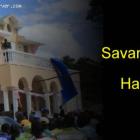ADVERTISEMENT
Michel Domingue - Haiti Observer Blog
Michel Domingue, Haiti Observer Blog. Read the following articles about Michel Domingue
Hannibal Price, Haitian author and diplomat
Born in Jacmel in 1841 to a well-to-do mulatto couple, Hannibal Price began life above the curve. His well-funded education gave him the means to rise high in various respects and he became known as an author as well as a diplomat, having had the post of ambassador from Haiti to the United States for three years from 1890 until his death in 1893.
Price also acted as a Provisional Government Counselor after President Michel Domingue's fall in 1875 and was a serious advocate of Florvil Hyppolite. During the time he played the role of Minister Plenipotentiary to Washington he wrote the book he would be most known for entitled, 'De la Réhabilitation de la Race Noire par la République d'Haïti' (On the Rehabilitation of the Black Race by the Republic of Haiti). This further journey into authorship and the subject matter discussed was said to be in answer to 'Hayti or the Black Republic' by Spenser St. John. Published posthumously, the book sets about to comprehensively show all the possibilities for Haiti if the chains of illiteracy and the consuming practice of vodou were not in existence. It also endeavored to defend the Negro race and present the country to the foreign world in a more friendly light through the discourse of the history and social life of Haiti so voluminously documented within the pages.
A Brief History of Haiti Constitution
The government of Haiti GOH) has passed almost as many constitutions as it has survived coup d'etats. Haiti's current Constitution, passed in 2012, is the 23rd one written into law.
The first Constitution of Saint-Domingue in 1801 appointed General Toussaint L'Ouverture as ruler for life. It also put an end to slavery, democratized hiring practices, and prohibited all religions except Catholicism. The 1805 Constitution allowed all forms of religious faith and approved reverse-race discrimination, calling all citizens black. The 1807 Constitution removed the reverse-race discrimination clause.
In 1816, the 1806 Constitution was revived, declaring President Alexandre Pétion President for Life. It also gave him unilateral power over Parliament. But under Jean-Baptiste Riché, the 1816 Constitution was put into effect again.
Role, Term of Haitian Presidents from Haiti Independence to 2013
The Haitian government is led by a president, who shares his/her executive power with the prime minister. Once elected by popular vote, the president will run the country for five years. After the term, the president could not run in the next election. He/she has to wait for five years in order to seek a second term. Haiti presidents can only serve for a maximum of two terms.
Not everyone can run for president as there are certain qualifications and requirements to be eligible for the seat. Only candidates with Haitian citizenship by birth can run for the position, as well as those who are at least 35 years of age. Jail sentence, loss of civil rights and lack of property ownership and residency can make a candidate ineligible to assume the position.
Les Cayes A Beautiful Town In Haiti
Les Cayes is a beautiful town located in southwest Haiti. It is the capital of the Sud Department and is situated on the Caribbean coast near the Ravine du Sud River. It is located southwest of Port-au-Prince, the capital of Haiti, at a distance of 196 km. It has six communes including Torbeck, Les Cayes, Maincihe, Camp-Perrin, Île à Vache and Chantal.
History Of Les Cayes
Since the other cays and small Île à Vache island are located near by, the town was given the name Aux Cayes, which means 'On the Cays'. Even now the old name is kept, besides the new name Les Cayes.
Michel Domingue Reluctant Leader of Haiti
Michel Domingue, 13th President of Haiti, began life in Les Cayes in 1813. Coming from an educated background, he attended military school where he graduated. A natural military leader, he was appointed a commander over army troops in the South Department, after graduation.
The Council of Secretaries of State (CSS), the then-current ruling body, appointed Domingue President of Haiti in June of 1874. Domingue, reluctant to assume many duties of office, appointed Septimus Rameau, a high-level official of the CSS to administer public functions of ruling. Rameau and Domingue were opposites, Rameau tyrannical and oppressive, Domingue retiring and melancholic.
Domingue's greatest strength lay in foreign policy. Upon assuming office, he negotiated a peace treaty with the Dominican Republic (DR), ending a brutal border conflict of several years duration. Author of the treaty, he sent both Rameau and Chief of Staff, General N. Léger, to Santo Domingo to draw up the accord. It was successfully signed into law on January 20, 1875.
Our objective is to share with you news and information about Haiti and the people of Haiti. Traditions, habits and the way we were or grew are alive in this site. We highly recommend that you Subscribe to our Newsletter and also share with us some of the things that are memorable and made us unique people.

 Life After Death
Life After Death  The Town of Savanette, Haiti
The Town of Savanette, Haiti  Haiti tech Summit
Haiti tech Summit  Haitian Thanksgiving
Haitian Thanksgiving  Maissade, Haiti
Maissade, Haiti